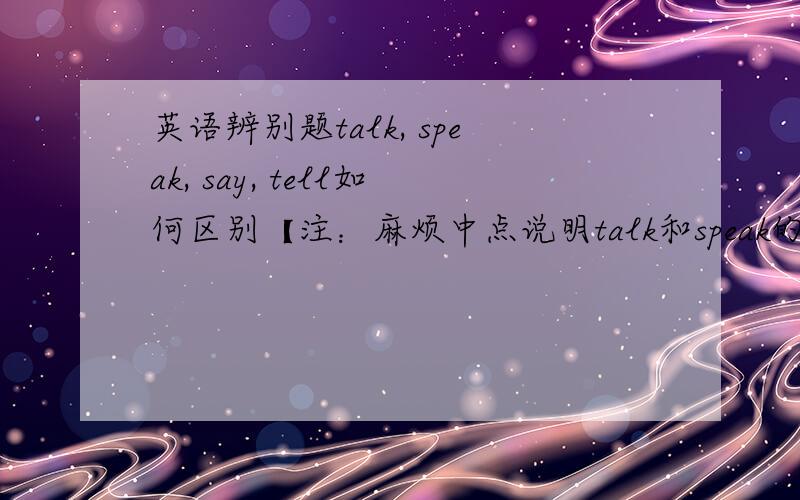英语辨别题talk, speak, say, tell如何区别【注:麻烦中点说明talk和speak的区别,即什么情况下用哪一个,谢了!)我希望尽可能简洁明了,拜托咯!!
来源:学生作业帮助网 编辑:作业帮 时间:2024/11/30 06:29:08

英语辨别题talk, speak, say, tell如何区别【注:麻烦中点说明talk和speak的区别,即什么情况下用哪一个,谢了!)我希望尽可能简洁明了,拜托咯!!
英语辨别题
talk, speak, say, tell如何区别
【注:麻烦中点说明talk和speak的区别,即什么情况下用哪一个,谢了!)
我希望尽可能简洁明了,拜托咯!!
英语辨别题talk, speak, say, tell如何区别【注:麻烦中点说明talk和speak的区别,即什么情况下用哪一个,谢了!)我希望尽可能简洁明了,拜托咯!!
Speak 意思是“讲话”,强调说话的能力,方式和对象,即可以作及物动词也可以作不及物动词.作及物动词时,常用表示语言的名词或代词作宾语.例如:
Look!She is speaking in the classroom.
瞧,她在教室里讲话呢.
Do you speak English?
你讲英语吗?
Say 意思是“说”,强调说话内容.例如:
"What are you saying?""I'm saying nothing."
“你在说什么?”“我什么也没有说.”
Please say it in English.
请用英语说.
Talk 意思是“谈”,与介词to 或with 连用表示“与…交谈”,与介词about 或of连用表示“谈论…内容”.例如:
May I talk to you?
我可以和你谈一谈吗?
Xiao Li is talking with her teacher.
小李正和她的老师谈话呢.
What are you talking about?
你们在谈论什么呢?
Tell 意思是“告诉”,表示告诉某人某事.例如:
Please tell us the good news.
请告诉我们好消息.
I have something to tell you.
TALK, SPEAK, SAY, TELL: As a general rule, these verbs
can often have more-or-less the same meaning if the construction is changed accordingly (see the examples which start in the next box)
...
全部展开
TALK, SPEAK, SAY, TELL: As a general rule, these verbs
can often have more-or-less the same meaning if the construction is changed accordingly (see the examples which start in the next box)
can vary considerably if used idiomatically, or as a phrasal verb (see the practice below)
SPEAK = TALK (same construction)
He is (in the middle of) speaking/talking to John
However, you cannot use SAY & TELL unless you change the construction
He is (in the middle of) saying something to John
He is (in the middle of) telling John something
SPEAK = TELL (different constructions)
Speak to him now = Tell him now
Speak to as many people as you can = Tell as many people as you can
TALK v SPEAK v SAY v TELL used in the imperative
SPEAK is often used in the imperative with an adverb or adverbial phrase
Speak quietly, etc.
Speak as loud as you can
TALK is rarely used in the imperative, but can carry a negative message
Talk to him if you must, (but I don’t want you to) (=If you insist on speaking to him, do so)
Don’t talk (=Say nothing)
Talk among yourselves
TELL is often used in the imperative for messages
Tell him I need some money
Tell him I will be back soon
Tell him I’ve gone to the shops
SAY is used in the imperative for wanting something said to you
Say something (to me) please (=speak to me )
Say something nice (= tell me something nice)
Say yes/Say no (= tell me you want/don't want to)
收起